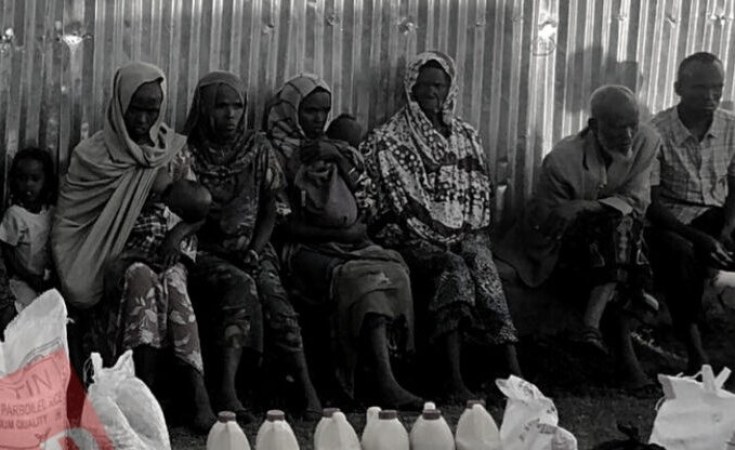A newly flared conflict between Ethiopia's Oromo and Amhara ethnic groups could disrupt security situation in the country after the Tigray peace agreement.
The fledgling peace agreement in Ethiopia is holding but the multiethnic state, battered by two years of civil war, is extremely fragile.
While weapons have largely fallen silent in northern Tigray since November, an old conflict is flaring up in the interior of the country where Oromo and Amhara ethnic groups and government troops are fighting.
The Oromo and Amhara, the Ethiopia's two largest ethnic groups, accuse each other of killing civilians. Their conflict began escalating last year, Ahmed Soliman, an expert on the Horn of Africa at London-based Chatham House think tank, says.
Security crisis worsens
"Much of the violence is taking place in the border areas between the two regions, as well as where Amhara and Oromo communities reside as minority groups in other regions," Soliman told DW.
The confrontation between these regional forces has led to an unprecedented security crisis in the country, he says.
The Associated Press (AP) reported this week that several dozen civilians and fighters have died in recent days alone.
In Senbete in Oromia Zone, an Oromo-populated area in Amhara State, one resident told DW: "The conflict started on Monday. There were many casualties in the late morning."
Thereafter, he said, heavy weapons were fired and many people were injured.
Increasing attacks have reportedly prompted many residents to flee Shewa Robit, a town in southeastern Amhara State near Oromia Zone.
"I saw four members of the [Amhara] special forces buried in one place. At the same time, we buried three or four others in St. Mary's Church. After that, another grave was dug," a resident told DW.
Resurgence of historic conflicts
For centuries, Ethiopia was dominated by the elites of what is today the northernmost provinces of Tigray and Amhara, while the Oromo have been striving for autonomy for almost as long.
Since the settlement of ethnic Amhara communities in parts of Oromia in the 1970s and 1980s, there have been repeated clashes between the new inhabitants and the Oromo over land and resources, Soliman says.
Those clashes have intensified dramatically since Prime Minister Abiy Ahmed's government took office in 2018, he says. Fighting between Oromo and Amhara militias has occurred regularly, often resulting in significant displacement, he said.
Experts say the Tigray war created a security vacuum in the rest of the country, which made it possible for Oromo Liberation Army (OLA) rebels to escalate the conflict in Oromia. The region is now Ethiopia's most unstable.
According to Soliman, the OLA has sought to solicit the support of local Oromo communities by accusing the Amhara of land grabbing in the region. The multiplicity of security-related actors is exacerbating the crisis, Soliman warns. There must be political dialogue to create stability in this situation, the Horn of Africa expert says.
Tentative hope for Tigray
Meanwhile, hope is emerging that the situation in Tigray will stabilize further after the November peace deal.
Aid deliveries to Tigray have since resumed and key infrastructure is slowly being restored, Soliman says. "There have been rounds of talks on the implementation of the agreement, which is a positive trend."
A withdrawal of Tigrayan forces is still underway. The TPLF says up to 65% of its forces have surrendered their heavy weapons in the presence of African Union observers.
Still, a big question mark remains, says Soliman: "It's about complete disengagement, which the Tigrayans say will only happen in parallel with the withdrawal of foreign and other non-government forces, by which they mean the Eritrean army and the Amhara militia."
The peace agreement also requires that federal forces be able to guarantee the sovereignty and territorial integrity of Ethiopia's borders, Soliman says. That would mean the withdrawal of Eritrean forces from Ethiopian territory, including Tigray. "And that is the key to ensuring sustainable peace in the north of the country," Soliman told DW.
Distrust persists
David Shinn, an Africa expert at George Washington University in the US, also sees this point as crucial. Shinn says he has the impression that a relatively good relationship has developed between the Tigrayan defence forces and Ethiopia's national army.
"I think there is still a lot of mistrust between the Tigrayan and Eritrean forces. So many atrocities were committed during the time Eritreans were in the Tigray region that it will take a long time to rebuild trust," Shinn told DW.
Eritrea, the Red Sea country that borders Tigray, had deployed troops to support Ethiopian forces early in the war. It was not involved in the peace agreement, however, Shinn says.
"If all Eritrean troops don't leave Ethiopia, the peace agreement is very much in question."
But for peace to be sustainable, the many tensions between individual ethnic groups would also have to be resolved. Things have remained comparatively quiet in southern Ethiopia.
A referendum is set for Feburary 6 in the six zones and five special districts of the Southern Nations, Nationalities and Peoples' Regional State (SNNPR), in which voter are to decide on a possible 12th state.
Eshete Bekele and Mohammed Negash contributed to this article.
Edited by: Benita van Eyssen


